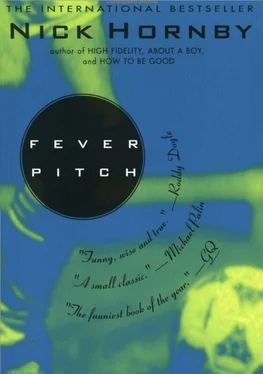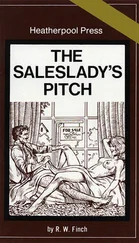My parents were separated by 1968. My father had met someone else and moved out, and I lived with my mother and my sister in a small detached house in the Home Counties. This state of affairs was unremarkable enough in itself (although I cannot recall anyone else in my class with an absent parent—the sixties took another seven or eight years to travel the twenty-odd miles down the M4 from London), but the break-up had wounded all four of us in various ways, as break-ups are wont to do.
There were, inevitably, a number of difficulties that arose from this new phase of family life, although the most crucial in this context was probably the most banal: the commonplace but nevertheless intractable one-parent Saturday-afternoon-at-the-zoo problem. Often Dad was only able to visit us midweek; no one really wanted to stay in and watch TV, for obvious reasons, but on the other hand there wasn’t really anywhere else a man could take two children under twelve. Usually the three of us drove to a neighbouring town, or up to one of the airport hotels, where we sat in a cold and early-evening deserted restaurant, and where Gill and I ate steak or chicken, one or the other, in more or less complete silence (children are not great dinner conversationalists, as a rule, and in any case we were used to eating with the TV on), while Dad watched. He must have been desperate to find something else to do with us, but the options in a commuter-belt town between 6.30 and 9.00 on a Monday night were limited.
That summer, Dad and I went to a hotel near Oxford for a week, where in the evenings we sat in a deserted hotel dining room, and where I ate steak or chicken, one or the other, in more or less complete silence. After dinner we went to watch TV with the other guests, and Dad drank too much. Things had to change.
My father tried again with the football that September, and he must have been amazed when I said yes. I had never before said yes to any suggestion of his, although I rarely said no either. I just smiled politely and made a noise intended to express interest but no commitment, a maddening trait I think I invented especially for that time in my life but which has somehow remained with me ever since. For two or three years he had been trying to take me to the theatre; every time he asked I simply shrugged and grinned idiotically, with the result that eventually Dad would get angry and tell me to forget it, which was what I wanted him to say. And it wasn’t just Shakespeare, either: I was equally suspicious of rugby matches and cricket matches and boat trips and days out to Silverstone and Longleat. I didn’t want to do anything at all. None of this was intended to punish my father for his absence: I really thought that I would be happy to go anywhere with him, apart from every single place he could think of.
1968 was, I suppose, the most traumatic year of my life. After my parents’ separation we moved into a smaller house, but for a time, because of some sort of chain, we were homeless and had to stay with our neighbours; I became seriously ill with jaundice; and I started at the local grammar school. I would have to be extraordinarily literal to believe that the Arsenal fever about to grip me had nothing to do with all this mess. (And I wonder how many other fans, if they were to examine the circumstances that led up to their obsession, could find some sort of equivalent Freudian drama? After all, football’s a great game and everything, but what is it that separates those who are happy to attend half a dozen games a season—watch the big matches, stay away from the rubbish, surely the sensible way—from those who feel compelled to attend them all? Why travel from London to Plymouth on a Wednesday, using up a precious day’s holiday, to see a game whose outcome was effectively decided in the first leg at Highbury? And, if this theory of fandom as therapy is anywhere near the mark, what the hell is buried in the subconscious of people who go to Leyland DAF Trophy games ? Perhaps it is best not to know.)
There is a short story by the American writer Andre Dubus entitled “The Winter Father”, about a man whose divorce has separated him from his two children. In the winter his relationship with them is tetchy and strained: they move from afternoon jazz club to cinema to restaurant, and stare at each other. But in the summer, when they can go to the beach, they get on fine. “The long beach and the sea were their lawn; the blanket their home; the ice chest and thermos their kitchen. They lived as a family again.” Sitcoms and films have long recognised this terrible tyranny of place, and depict men traipsing round parks with fractious kids and a frisbee. But “The Winter Father” means a lot to me because it goes further than that: it manages to isolate what is valuable in the relationship between parents and children, and explains simply and precisely why the zoo trips are doomed.
In this country, as far as I know, Bridlington and Minehead are unable to provide the same kind of liberation as the New England beaches in Dubus’s story; but my father and I were about to come up with the perfect English equivalent. Saturday afternoons in north London gave us a context in which we could be together. We could talk when we wanted, the football gave us something to talk about (and anyway the silences weren’t oppressive), and the days had a structure, a routine. The Arsenal pitch was to be our lawn (and, being an English lawn, we would usually peer at it mournfully through driving rain); the Gunners’ Fish Bar on Blackstock Road our kitchen; and the West Stand our home. It was a wonderful set-up, and changed our lives just when they needed changing most, but it was also exclusive: Dad and my sister never really found anywhere to live at all. Maybe now that wouldn’t happen; maybe a nine-year-old girl in the nineties would feel that she had just as much right to go to a game as we did. But in 1969 in our town, this was not an idea that had much currency, and my sister had to stay at home with her mum and her dolls.
I don’t recall much about the football that first afternoon. One of those tricks of memory enables me to see the only goal clearly: the referee awards a penalty (he runs into the area, points a dramatic finger, there’s a roar); a hush as Terry Neill takes it, and a groan as Gordon Banks dives and pushes the ball out; it falls conveniently at Neill’s feet and this time he scores. But I am sure this picture has been built up from what I have long known about similar incidents, and actually I was aware of none of this. All I really saw on the day was a bewildering chain of incomprehensible incidents, at the end of which everyone around me stood and shouted. If I did the same, it must have been an embarrassing ten seconds after the rest of the crowd.
But I do have other, more reliable, and probably more meaningful memories. I remember the overwhelming maleness of it all—cigar and pipe smoke, foul language (words I had heard before, but not from adults, not at that volume), and only years later did it occur to me that this was bound to have an effect on a boy who lived with his mother and his sister; and I remember looking at the crowd more than at the players. From where I was sitting I could probably have counted twenty thousand heads; only the sports fan (or Mick Jagger or Nelson Mandela) can do that. My father told me that there were nearly as many people in the stadium as lived in my town, and I was suitably awed.
(We have forgotten that football crowds are still astonishingly large, mostly because since the war they have become progressively smaller. Managers frequently complain about local apathy, particularly when their mediocre First or Second Division team has managed to avoid a good hiding for a few weeks; but the fact that, say, Derby County managed to attract an average crowd of nearly seventeen thousand in 1990/91, the year they finished bottom of the First Division, is a miracle. Let’s say that three thousand of these are away supporters; that means that among the remaining fourteen thousand from Derby, there were a number of people who went at least eighteen times to see the worst football of last or indeed most other seasons. Why, really, should anyone have gone at all?)
Читать дальше











